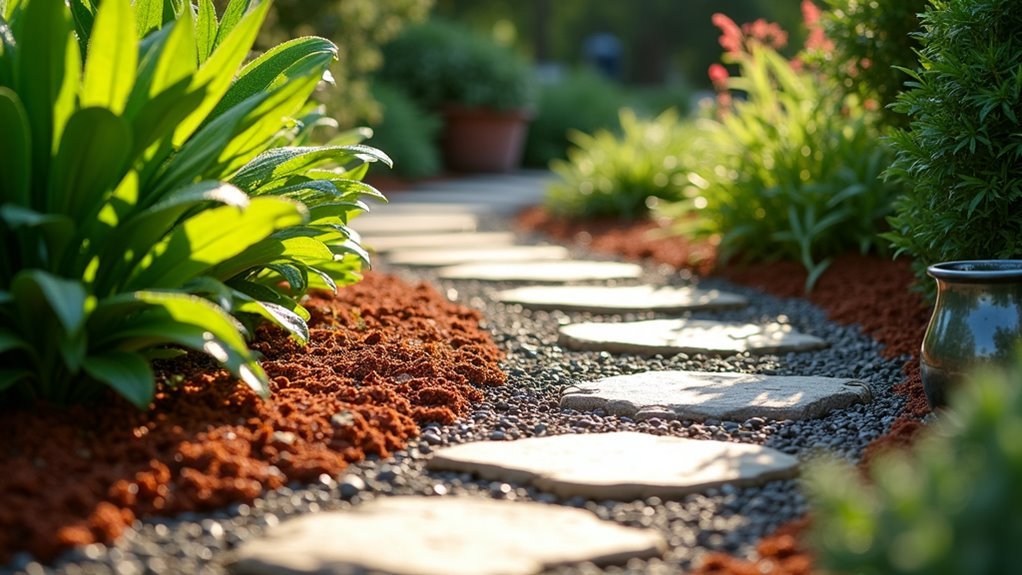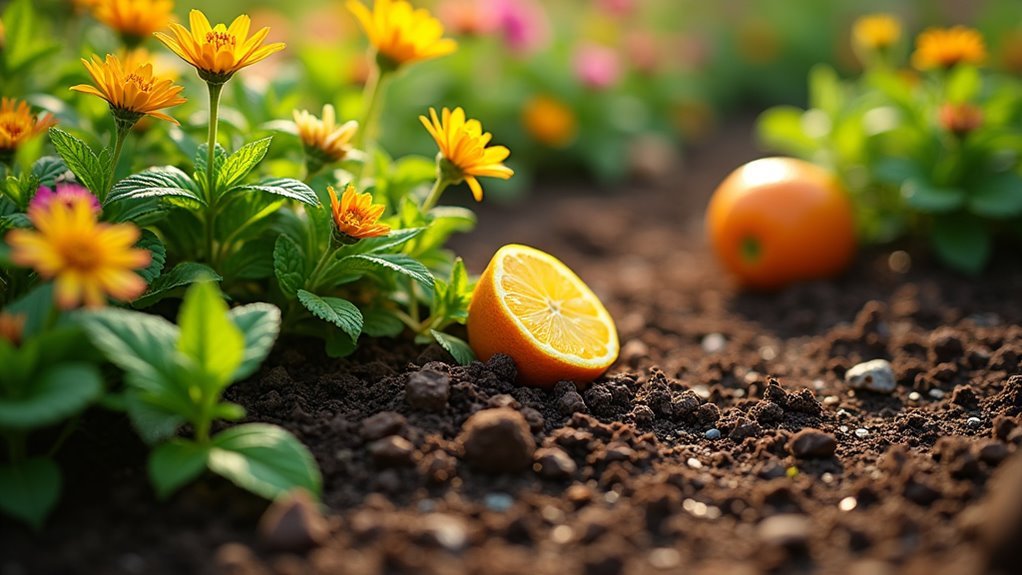You can repel ants from your landscape by planting aromatic herbs like mint, rosemary, and thyme around your property’s perimeter. Create physical barriers using gravel and rock borders that disrupt ant trails and limit nesting sites. Eliminate moisture sources by fixing leaks and ensuring proper drainage throughout your garden beds. Remove food attractants by cleaning up fallen fruit, storing pet food properly, and managing aphid populations that produce honeydew. These strategic landscaping changes will reveal additional protective techniques.
Plant Ant-Repelling Herbs and Flowers Around Your Property

Nature provides some of the most effective ant deterrents right in your garden. You can plant ant-repelling herbs like mint, rosemary, and thyme around your property to create natural barriers. These herbs release a strong scent that ants find unpleasant, keeping them away from your home.
Complement these with flowers such as lavender and marigolds near entry points where ants typically enter. Unlike other plants that attract aphids—a primary food source for ants—these flowers won’t draw unwanted visitors. The plant stems and foliage work together to repel ants effectively.
Creating a diverse garden ecosystem with various natural deterrents strengthens your defense against infestations while enhancing your landscape’s beauty and overall health.
Create Physical Barriers Using Gravel and Rock Perimeters
While plants create aromatic deterrents, you can establish a more permanent defense by installing gravel and rock perimeters around your home’s foundation.
These physical barriers limit ant access and nesting opportunities since ants prefer soft, moist soil for colonies. Rock perimeters effectively disrupt ant trails, making it harder for them to locate food and water sources near your home.
Rock barriers force ants to find alternate routes, disrupting their established pathways to food and water sources around your foundation.
Unlike organic mulch that decomposes and attracts pests, gravel doesn’t decay, providing long-lasting protection.
To create an effective barrier, install your rock perimeter at least 3-4 inches deep and extend it several feet from your foundation.
Regular maintenance guarantees ongoing ant deterrence—check for gaps where soil becomes exposed and replenish rocks as needed to maintain the barrier’s integrity.
Eliminate Moisture Sources and Maintain Proper Drainage

Beyond establishing physical barriers, controlling water sources around your property creates an inhospitable environment for ant colonies.
You’ll need to eliminate moisture sources by regularly inspecting for leaky hoses, bird baths, and standing water that attract ants seeking hydration. Ascertain proper drainage in garden beds and around your home to prevent water accumulation that encourages ant nesting.
Avoid creating soggy soil by watering plants deeply but infrequently rather than frequent shallow watering.
Implement landscaping techniques like grading soil away from structures to direct runoff effectively. Choose gravel over traditional mulch to reduce moisture retention while improving drainage solutions.
These strategic water management practices considerably reduce the damp conditions that make your landscape attractive to ant colonies.
Remove Food Sources That Attract Ants to Your Landscape
Three primary food sources consistently draw ants into residential landscapes: sugary substances, protein-rich materials, and decaying organic matter. You’ll need to remove food sources systematically to break their attraction cycle.
| Food Source | Action Required |
|---|---|
| Food scraps and garbage residue | Clean spills immediately after outdoor meals |
| Pet food containers | Store in sealed containers, never leave outside |
| Decaying organic matter | Remove fallen fruit and dead plant material |
| Leaky water fixtures | Repair hoses and eliminate excess moisture |
| Aphid-infested plants | Conduct regular inspections, treat honeydew producers |
Regular inspections help you identify what attracts ants before colonies establish nesting sites. Focus on eliminating aphid-infested plants that produce honeydew, as this sticky substance creates long-term food sources that’ll continuously draw ants back to your landscape.
Manage Mulch and Organic Matter to Prevent Ant Nesting

Although organic mulch provides valuable benefits for plant health, it creates ideal nesting conditions that’ll attract ants to your landscape. To prevent ants from establishing nesting sites, you’ll need to manage mulch strategically.
Replace organic matter annually and monitor mulch depth, keeping it minimal to avoid moisture buildup. Consider switching to inorganic mulches like gravel or river rock near your home’s foundation, as these don’t decompose.
Maintain healthy plants and guarantee proper drainage throughout your landscape. Avoid overwatering, which creates damp conditions perfect for ant colonies.
When you keep aphid populations under control through proper plant care, you’ll eliminate another food source that draws ants to decaying organic materials in your mulched areas.
Frequently Asked Questions
What Is the Best Landscaping to Deter Ants?
You’ll want to plant mint, rosemary, and thyme around your garden, create rock perimeters with gravel, maintain healthy vegetation regularly, and replace mulch annually to effectively deter ants naturally.
What Smell Do Ants Absolutely Hate?
You’ll find ants absolutely hate peppermint oil’s smell most. It disrupts their communication and navigation completely. Citrus scents from lemon peels, vinegar’s strong odor, and essential oils like tea tree also overwhelm their sensory receptors effectively.
How Do I Permanently Get Rid of Ants in My Yard?
Plant mint, rosemary, and lavender as natural deterrents. Replace mulch with gravel perimeters, maintain healthy lawns by avoiding overwatering, and apply diatomaceous earth around nests to permanently eliminate ants.
What Do Ants Hate the Most?
Ants hate strong herb scents like peppermint and lavender most, as they disrupt their communication. You’ll also find they despise citrus oils, diatomaceous earth, vinegar, and coffee grounds equally.
In Summary
You’ve got the tools to keep ants away from your landscape naturally. Plant repelling herbs, create gravel barriers, fix drainage issues, remove food sources, and manage your mulch properly. These simple changes’ll make your property less attractive to ant colonies without harsh chemicals. Stay consistent with maintenance, and you’ll notice fewer ant problems around your home. Your yard can be beautiful and ant-free with these proven landscaping strategies.





Leave a Reply